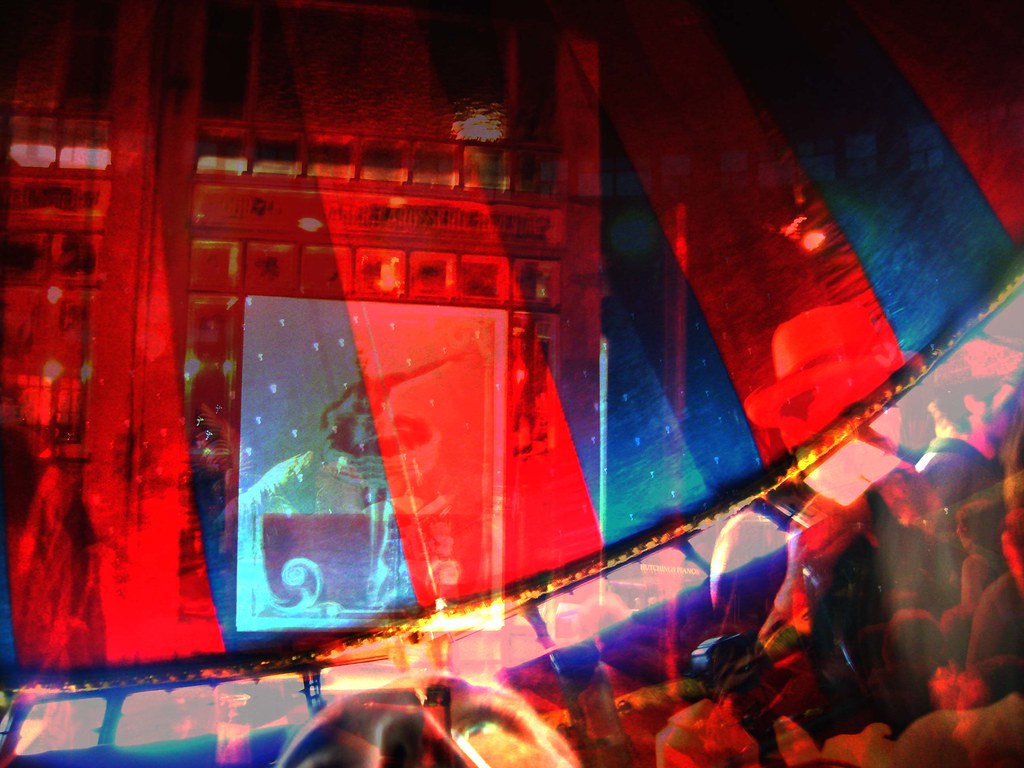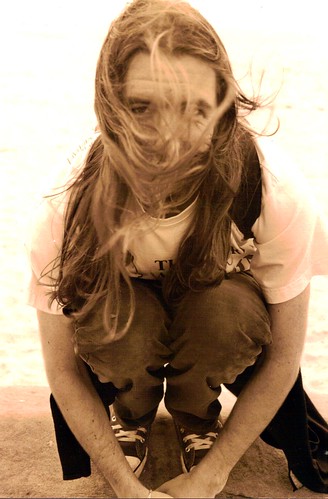 choose your own way
choose your own way i will remain
as the ghost in fading pages
and the dust between the cracks
'Ashes',
The Paradise Motel
I can still recall the exact moment the bulk of my thankfully still nascent music collection was rendered unlistenable evermore. The night after my 18th birthday I caught the train up to Sydney to The Basement to see my first ever (legitimately attended) 18+ show. I was there to see the specialness that is Josh Haden’s Spain, supported by a new Australian band about which I had been hearing more than the occasional excitable murmur, by the name of The Paradise Motel.
Drifting out onto the tiny Basement stage, these sartorially splendid Tasmanian/Melbournian boys and girl seemed to my overly vivid imagination to have stepped straight out of a Great Gatsby cocktail party (further starkening the later, unexpected appearance of tracksuit pants during the Spain set). The boys took up their places with their assorted musical toys as Merida Sussex glided up to the microphone, gazed around the hushed, smoke-misted room, and it happened.
smiling from the page
lied about my age
now I’m lost forever in this town
I wasn't the only one in the hushed room to realise there was something a bit special happening here, quite unlike anything I had encountered in music up to that time. As the set continued, it was a near note-perfect lesson in what I have since come to seek in almost all my music-snooping meanderings – what the band themselves later described as ‘the violence and the silence’.
The set continually took us to the verge of a perfect storm, only to each time step back from the brink.
Instead of the longed for release, I was being wrapped ever more tightly in a cold, coiled menace. Pacing the stage like a wounded wombat, lyric penner and primary songwriter Charles Bickford was the most on edge, guitar slung low, foppish fringe dangling, bumping into his fellow members. But he wasn’t yet being let off his leash, and though a troubled rumble was swelling in the music, it was still being held at bay. The rhythm section was still keeping it all in check at this stage, along with the haunting voice of a gently swaying Merida Sussex, the rockingest librarian that ever there was.
danger all around
pulling me down
love for me is never to be found
Merida had a knack, never missing from a single show I went on to see, of convincing everyone in the room that she was singing directly to them. Her piercing, eye-locking gaze seemed a challenge, almost, daring you to suggest the songs were coming from anywhere but a place of utter musical integrity. It has always seemed to me a voice strangely free of emotion, yet in its icy detachment it is somehow altogether more convincing in the tales it tells.
During this particular encounter, the inevitable finally occurred. Everything, of course, had to tumble down. The drums finally let out some chain and nobody let their chance slip. The bass boiled over as the guitars crashed into a metallic, junked heap, while the Hammond – that ridiculous, hulking beast they insisted on dragging from show to show – stoically took one of its absolute beatings, thumped and kicked and thrashed into submission.
Standing solitary before all this, barely a hair moving from place,
Merida carried the whole thing through, the ice queen who could melt any heart.
From that moment I was hooked – not on ‘valium’s wishing bone’ as per 'Stones', but in this delicious noir web they so effortlessly weaved. They had moved me without whining at me, destroyed my resistance without numbing my resolve.
Caress before catharsis.
At this stage, 1996, The Paradise Motel had only released a solitary EP, Left Over Life To Kill, with the scattered scraps and remix outing Some Deaths Take Forever soon to follow. I managed to catch a generous handful of shows and their first (and only) two full-length albums over the next two years, following them into tiny caves in Kings Cross, corner pubs in Melbourne and RSL clubs in Wollongong.
One of the rewarding joys of this happy stalking was that no two shows was remotely alike – compulsive deconstructionists, there was no such thing as a definitive version of a song.
What may have been the incidental scraps and scrapings of one show became the lynchpin of the next, the beating heart of one night the shed skin of another. Their line-up would ebb and flow, with the occasional appearance of a string-quartet or brass section adding some lovingly textured layers, or an extra guitarist prompting tingling, scissors-on-strings, electrified terror.
But whatever the make-up, there was always a moving, living heart beating beneath Merida’s voice – a bass pulsing like blood through your temples, knife-edge metallic guitar jangling, strummed acoustic warmth and that mad old Hammond.
On the live stage The Paradise Motel was most certainly a collective effort. But behind the scenes, while Matt Aulich cobbled together some memorable string arrangements and always seemed the most proficient musician, one felt Charles was the mad scientist with the vision. And the boy certainly had an ear, turning his deft hand to producing an amazing album by my lovely school friends, those krazy Kiama kids Arrosa.
Charles helped hone the sublime, aching, fractured artistry of these then teens into a beautiful beast, but the album sadly never saw the light after the always fragile band imploded on the brink of… who knows what?
While I hadn’t heard anything quite like it before, The Paradise Motel wasn’t entirely without reference points. The dreamy, reverb-soaked miasma was not a million miles from Underground Lovers. The nattily suited, sideshow drama nodded to a certain incarnation of Nick Cave. Dirty Three, Low and Mazzy Star are all there too - maybe even a hint of Portishead or Lamb - but not in any easily discernible style or sound or obvious conceit. It is there and not there, in the way one may lazily group Faulkner, Steinbeck and Salinger – it’s fair and fruitless at the same time.
If a band can ever be summed up in a single song, it was, for The Paradise Motel, the two-act 'Men Who Loved Here (Grew Sadder)'. Opening with a jagged, wrenching slice of feedback and gentle if minor acoustic chords, the signs are more than a little ominous. Come the 36 second mark, viciously abrasive guitars slashing in like a rusty scalpel wielded by a deranged doctor slit the whole thing open. Merida’s reassuring view on the matter?
the agony
will set you free
There is precious little of their music floating around the webisphere, and I guess it's really not a vision that translates well to a little yootoobish box. But perhaps the closest clip to capturing the quintessence of The Paradise Motel would be bad light.
So, it’s a tad melodramatic and no doubt a little ostentatious. But it hit me there, in that spot, that only a select few have tickled since. And that’s perhaps the bittersweet twist in this tale. They ruined so much music for me that I had until then happily, mindlessly enjoyed.
Perhaps The Paradise Motel struck a lasting chord with me because at the heart of things they were not simply performers but also consummate storytellers; first and foremost as chroniclers of the disappeared. I didn’t realise this straight away, so it was somewhat curious to discover over time that my initial response to the music somehow picked up on this at some level. From those very first moments I had felt this was somehow a musical instantiation of Picnic Rock – both the haunting and haunted Victorian place of myth and mystery, shrouded as it is in mists real and imagined, and the classic Peter Weir film.
Which finally brings me to the point of this nostalgic little wander down musical memory lane.
The Paradise Motel left our shores in the late 1990s to try their luck in the UK and had disintegrated within two years. But now, 10 years on, they are finally about to release their third studio album. This latest musical outing is conceptially inspired by and entirely devoted to the mother of all Australian disappearances, that of Azaria Chamberlain. The unfortunate Azaria, whose purported disappearance-via-dingo remains officially unsolved, would have been 30 this June 11 - the date The Paradise Motel will release Australian Ghost Story. This thematic realm has the band back doing what they do best, delving back into their spiritual home - that of our most haunted country.
 While there have been other great Australian bands before, during, and since The Paradise Motel, and allowing that there are the occasional moments that have dated a little more than ideal for a 'timeless' tag, my revisiting of these earlier recordings with fresh ears still leaves me with the softest of soft spots for these marvellous if morbid miscreants.
While there have been other great Australian bands before, during, and since The Paradise Motel, and allowing that there are the occasional moments that have dated a little more than ideal for a 'timeless' tag, my revisiting of these earlier recordings with fresh ears still leaves me with the softest of soft spots for these marvellous if morbid miscreants.

No comments:
Post a Comment